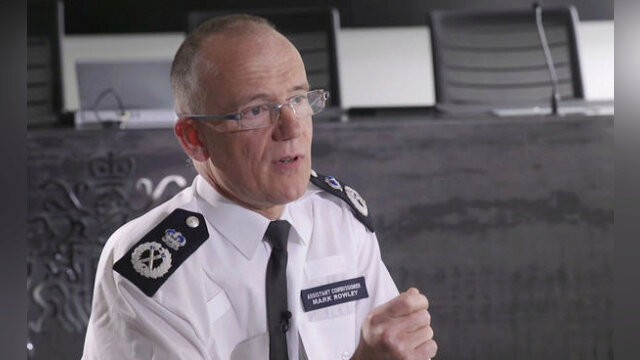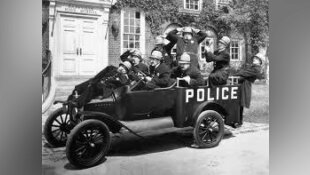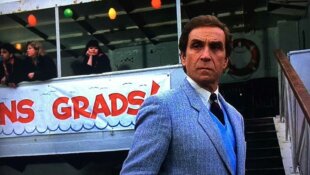
AC Mark Rowley made public on TV that Operation Grange is a complete fraud
- By Jill Havern
- 6934 views

Assistant Commissioner Mark Rowley made public on national TV that Operation Grange is a complete fraud. Pat Brown, Criminal Profiler
Transcript of interview between AC Mark Rowley (MR) and broadcast media for use from 21:00hrs on Tuesday, 25 April 2017.
Q: Six years’ on of Scotland Yard’s involvement, a team of largely 30 people, £11/12 million you’ve spent, what have you achieved?
MR: We’ve achieved an awful lot. I think you know that we have a track record for using cold cases on serious old cases, and we solve many cases that way. This is no different in one respect but is particularly complicated. I think people get seduced perhaps by what they see in TV dramas where the most complex cases are solved in 30 minutes or 60 minutes with adverts as well. What we started with here was something extraordinary. We started with 40,000 documents. We’ve got the original Portuguese investigation and six or eight sets of private detectives who’ve done work and we did appeals to the public, four Crimewatch appeals, hoovering as much information as possible. Sifting that, structuring it and working through it is an immense effort. It’s much more ‘hard slog’ in reality than it is inspiration. That takes time and it takes systems. That’s what we’ve been working on. And what you’ve seen in the bits which have been reported publically is those appeals, when we’ve announced suspects, when we’ve made particular announcements, slowly crunching through it and focusing our attention and making progress. And of course at one stage we had 600 people who at one stage have been of interest to the enquiry, that doesn’t mean that they are suspects, people who were suspicious at the time or have a track record which makes us concerned about them, sifting, which focused the enquiry increasingly and when you’re doing this then across a continent and with multiple languages and having to build working relationships with the Portuguese, you put that together and that takes real time.
So we’ve achieved complete understanding of it all, we’ve sifted out many of the potential suspects, people of interest, and where we are today is a much smaller team, focused on a small remaining number of critical lines of enquiry, which we think are significant. If we didn’t think they were significant we wouldn’t be carrying on.
Q: So when you talk of success and progress, it’s really a case of eliminating things? You’re not getting any nearer to finding out what happened?
MR: So our mission here is to do everything reasonable to provide an answer to Kate and Gerry McCann. I’d love to guarantee them that we would get an answer, sadly investigations can never be 100 per cent successful. But, it’s our job, and I’ve discussed it with them, we’ll do everything we can do, reasonably, to find an answer to what’s happened to Madeleine. And I know, Pedro, the senior Portuguese colleague I’ve worked with and his team, have a shared determination, to find an answer. That’s what we’re going to do.
Q: You’ve described it as a ‘unique’ case. Why is it unique?
MR: I think it’s unique in two or three respects. First of all the way its captured attention in different countries is quite unusual. You’ll get a very high-profile case in a particular country, the way it has captured interest across countries, I think is significant. The length of it. And it’s unusual to have a case like this where you’re doing a missing persons investigation, where ten years on, we still don’t have definitive evidence about exactly what’s happened. And that’s why we’re open minded, even if we have to be pessimistic about the prospects, we are open minded because we don’t have definitive evidence about what happened to Madeleine.
Q: You say you haven’t got definitive evidence, do you have any clues at all which might explain what happened to her?
MR: So, you’ll understand from your experience, the way murder investigations work, detectives will start off with various hypotheses, about what’s happened in a murder, what has happened in a missing person’s investigation, whether someone has been abducted. All those different possibilities will be worked through. This case is no different from that but the evidence is limited at the moment to
be cast iron as to which one of those hypotheses we should follow. So we have to keep an open mind. As I said we have some critical lines of enquiry, those linked to particular lines of enquiry, but I’m not going to discuss them today because they are very much live investigations.
Q: Do you have some evidence, in your six years of investigation, have you unearthed some evidence to explain what happened?
MR: We’ve got some thoughts on what we think the most likely explanations might be and we’re pursuing those. And those link into the key lines of enquiry we’re doing now. As I said, those are very much live investigations and I know that’s frustrating when you’re doing a programme looking back but it’s hard to talk about that now, it’s going to frustrate the investigation.
Q: I know it’s not your money, it has come from the Home Office, but how do you justify spending so much on one missing person?
MR: Big cases can take a lot of resource and a lot of time and we have that with more conventional cases which Scotland Yard gets involved with that run over many years. I think it’s worth noting that this cold case approach we do, every year we’re solving cases that have gone cold years ago. I think in the last year it’s 35 rape cases, and two murder cases. Some of those reaching back to the 1980s. The cold case approach does have some expense, it is time-consuming, looking back at old records, but it does help solve old cases and you give families and victims an understanding of what went on. It’s worthwhile. This case is unusual, it’s not in Scotland Yard’s remit to investigate crimes across the world normally. In this case, in 2011, the Portuguese and British prime ministers were discussing the case and agreed that Scotland Yard would help and recognising that it’s not what we’re normally funded for, we were given extra money to put a team together to work with the Portuguese and that’s what we’ve been doing ever since. We’ve tried to be careful about public money and we started with that massive sifting and we’ve narrowed the enquiry, the funding has reduced accordingly. And we will stick with it as long as the funding is available, as long as there are sensible lines of enquiry to pursue.
Q: You’ve talked about 600 people. You at one point had four suspects. Can you tell me the story about how they came into the frame?
MR: So, one of the lines of enquiry, one of the hypotheses was could this be a burglary gone wrong? Someone is doing a burglary, panicked maybe by a waking child, which leads to Madeleine going missing.
Q: Most burglars would just run out.
MR: Possibly.
Q: Difficult for the public to understand that potential theory, given that every child wakes up.
MR: In my experience, if you try to apply the rational logic of a normal person sat in their front room to what criminals do under pressure, you tend to make mistakes, so it was a sensible hypothesis, it’s still not entirely ruled out, but there was also lots of material about people acting suspiciously, a potential history of some recent thefts from holiday apartments. Working through that it was a sensible thing to pursue, and we had some descriptions to work with, and that led to us identifying amongst the 600, a group of people who were worth pursuing, have they been involved in this activity, have they had a role in Madeleine going missing? Because what the hypothesis was, then we’ve got some searches, we’ve worked with the Portuguese, they were spoken to, and we pretty much closed off that group of people. That’s one example of the journey I spoke about, you start with this massive pool of evidence, you understand it, structure it, prioritise it, you work through and you try and sift the potential suspects, and then you end up where we are today with some key lines of enquiry.
Q: As I understand it, the key to your suspicion about those four suspects was very much to do with
their use of mobile phones and one of the criticisms of the original Portuguese police investigation was that they didn’t interrogate the mobile phone data as thoroughly as they could have done. How important was it for you as that part of your investigation for you to pick up and thoroughly investigate the mobile phone data?
MR: So that phone data is always something we will look at and we wouldn’t have had it available if the Portuguese had not got hold of it at the time so we need to be careful about criticism. But we had the data available and we worked with the Portuguese and that was part of the background to do with phone data and various sightings. There was enough there to say, not to prove the case, but there was something worth looking at in more detail and that’s what we did.
Q: How old were the suspects because I think you interviewed them originally through the Portuguese beginning of July 2014?
MR: By the end of the year we were happy to have brought them out and we were moving on to other parts of the investigation.
Q: Do you have any other suspects at the moment?
MR: So, we have got some critical lines of enquiry that are definitely worth pursuing and I’m not going to go into further detail on those. Another I would say though is, these lines of enquiry we have to date, they are the product of information available at the time and information that has come from public appeals that we have done. Four Crimewatch appeals, and other media channels have been incredibly helpful, including yourselves, and thousands of pieces of information have come forward, some useful some not, but amongst that have been some nuggets that have thrown some extra light on the original material that came from the time and that is one of the things that has helped us to make progress and have some critical lines of enquiry we are pursuing today.
Q: The question of other suspects, is there anyone like those four who have been dismissed, is there anyone who has the “alguido” status?
MR: I’m not going to give that level of detail away, we have got some critical lines of enquiry and we are working with the Portuguese on that, we are both interested in. Disclosing any more information on that will not help the investigation.
Q: You said the burglary gone wrong theory is not completely dismissed. What are the other theories? You have spoken in the past, Andy Redwood spoke in the past about focussing on the idea of a stranger abduction, is that still the focus, or a focus?
MR: Whilst we’ve got some lead ideas there is still a lot of unknown on this case. We’ve got a young girl gone missing 10 years ago. Until we get to the point where we have solved it, we’re unlikely to have definitive evidence as to exactly what happened at the time. All the hypothesises that you or I could come up with, they all have to remain open and the key lines of enquiry open today focus on one or two of those areas but we have to keep them all open until we get to that critical piece of evidence that narrows it down and helps us to be more confident as to exactly what has happened on the day Maddie went missing.
Q: Over the years you have appealed for a number of what could be called suspicious-looking men, watching the apartment, watching the apartment block. Knocking on the doors touting for a bogus charity. You have issued E-fits, have you been able to identify and eliminate any of those?
MR: Some of them have been identified and eliminated but not all of them.
Q: The theory of a sex predator responsible for Maddie’s disappearance is something the Portuguese police have focussed on. How big a part of your investigation has that been, because there were a series of sex attack on sleeping, mainly British children in nearby resorts. So how important has that
been to your investigation?
MR: That has been one key line of enquiry. The reality is in any urban area, you cast your net wide and you find a whole range of offences and sex offenders who live nearby and those coincidences need to be sifted out; what is a coincidence and what could be linked to the investigation we are currently dealing with and just like we do in London we have been doing in Portugal so offences which could be linked have to be looked at and either ruled in or ruled out and that’s the work we have been doing.
Q: Andy Redwood, the first senior investigating officer, said in one interview his policy was to go right back to the beginning, accept nothing, but one thing you appear to have accepted is that this was an abduction. It’s in your first remit statement, it refers to ‘the abduction’, which rather suggests right from the start you had a closed mind to the possibility of parents’ involvement, an accident or Madeleine simply walking out of the apartment.
MR: Two points to that, firstly the involvement of the parents, that was dealt with at the time by the original investigation by the Portuguese. We had a look at all the material and we are happy that was all dealt with and there is no reason whatsoever to reopen that or start rumours that was a line of investigation. The McCanns are parents of a missing girl, we are trying to get to the bottom of. In terms of Andy using the word abduction, she was not old enough to set off and start her own life. However she left that apartment, she has been abducted. It is not a 20-year-old who has gone missing and who has made a decision to start a new life, this is a young girl who is missing and at the heart of this has been an abduction.
Q: One of the biggest criticisms of the Portuguese investigation, which they acknowledge as well, is that they did not interrogate the parents from the start, if only to eliminate them. When you started your investigation, you appear to have done the same. Did you formally interview the McCann’s under caution, ever consider them as suspects?
MR: So when we started, we started five or so years into this and there is already a lot of ground been covered, we don’t cover the same ground, what we do is pull all the material we had at the start, all the Portuguese material, private detective material, with all the work that had been done, what that evidence supports, what rules these lines of enquiry out, what keeps them open and you progress forward. It would be no different if there were a cold case in London, a missing person from 1990, we would go back to square one look at all the material and if the material was convincing it ruled out that line of enquiry we would look somewhere else. So you reflect on the original material, you challenge it, don’t take it at face value. You don’t restart an investigation pretending it doesn’t exist and do all the same enquiries again that is not constructive.
Q: The first detective in charge of the case said he was going right back to the start of the case and accepting nothing. It seems very much he was suggesting that it was going to be a brand new investigation.
MR: It’s a brand new investigation, you are going in with an open mind. You are not ignoring the evidence in front of you. That would be a bizarre conclusion. You would look at that material, what does it prove, what it doesn’t. What hypothesis does it open what does it close down and you work your way through the case.
Q: Just to be clear you did not interview the McCanns as potential suspects?
MR: No
Q: Let’s move to today, recently you were given more funding £84,000 to £85,000, how is that going to be used?
MR: As you understand we started with a full-sized murder team of 30 officers, that was a standard
operating approach at the time. So we start with that team and work through the massive amount of investigation. The Home Office has been funding that and of course it is public money so they review that from time to time and as the enquiry has gone on we suggested we could run it with a smaller group of people and that is what happened. That recent level of funding reflects that it’s keeping the team going for the next six months and we will want to keep this running as long as there are sensible lines of enquiry and keep asking the Home Office to fund it as long as there are those open lines of enquiry.
Q: I know you don’t want to go into detail but are there more forensic tests, is that what is going on?
MR: I’m not going to talk about detail of the type of work going on but there are critical lines of enquiry of great interest to ourselves and our Portuguese counterparts and there are some significant investigative avenues we are pursuing that we see as very worthwhile.
Q: Are you still waiting for answers to new ‘rogatory’ letters. I understand how the system works if you want something in Portugal, you have to send ‘rogatory’ letter and get that approved over there. Are there letters in the post?
MR: That process you describe reflects the first four or five years of our work there, sifting through mass amounts of material, putting together with new evidence that comes from appeals, generates new enquiries and the legal requirements the Portuguese have is quite labour intensive in terms of dotting I’s and crossing T’s and working through that detail. Where we are now is much narrower much more focussed.
Q: Is there anyone you are still looking for?
MR: Where we are now is much narrower and much more focussed.
Q: There was a report recently that there was an international manhunt in regards to a person you were interested in talking to, maybe not even a suspect, maybe a witness?
MR: There are odd headlines and odd stories in newspapers on a regular basis and most of those are nonsense.
Q: You say in your statement, you are getting information on a daily basis, new information, what sort of information?
MR: First of all it is indicative of the level of interest in this case, not just in this country but across the world. The team are getting emails, phone calls, new information all the time and it ranges from the eccentric, through to information that on the surface looks potentially interesting and needs to be bottomed out and are constantly sifting through them.
Q: Are you any closer to solving this then you were six years ago?
MR: I know we have a significant line of enquiry that is worth pursuing, and because of that, it could provide an answer. Until we have gone through it, I won’t know if we will get there or not.
Q: What area is that enquiry?
MR: Ourselves and the Portuguese are doing a critical piece of work and we don’t want to spoil it by putting titbits out on it publically.
Q: How confident are you this will solve it for you?
MR: It is worth pursuing
Q: What does your instinct say about what happened to Maddie?
MR: If I start going in to my instinct having read the material of interest we are dealing with at the moment it would give away what we are looking in to so I’m not going to answer that. But what I would say from my experience of dealing with cold cases and these types of investigations is that this time, even sadly after 10 years of Maddie being missing there are nuggets of information and lines of enquiry that are worth pursuing and it is possible they may lead to an answer. As long as we have the resources to do it, and as long as we have those sensible lines of enquiry because if we can provide an answer to a family in this horrible situation that is what we must do.
Q: Do the significant lines of enquiry suggest to you Maddie is alive or dead?
MR: As I said earlier on we have no definitive evidence as to whether Maddie is alive or dead. We have to keep an open mind that is why we describe it as a missing person enquiry. Of course we understand why after so many years people would be pessimistic but we are keeping an open mind and treating it as a missing person enquiry.
Q: You’ve said you are realistic about what you are dealing with, what do you mean by that?
MR: We are realistic about the prospects and the assumptions people will make 10 years on when a little girl has gone missing but there is no definitive evidence and as long as that is the case we have to have an open mind and treat it as a missing person enquiry.
Q: If she is alive, she is nearly 14, do you have any idea what she might be doing, where she might be, the circumstances she might be living?
MR: That is such a hypothetical question I cannot begin to answer.
Q: There is a chance she may still be alive.
MR: We have to keep an open mind, it is a missing person enquiry, we don’t have that definitive evidence either way.
Q: How confident are you that you will solve the case?
MR: I wish I could say we will solve this. We solve more than 90 per cent of serious cases at Scotland Yard. I wish I could say I could definitely solve it but a small number of cases don’t get solved. What I have always said on this case and I’ve said to Kate and Gerry. We will do everything we can that is possible to try to find and answer. I hope to find an answer but can’t quite guarantee and as a professional police officer and dealing with the families in awful situations it always hurts you can’t guarantee success, but we will do everything we can to try to get there.
Q: How long might it keep going, your investigation?
MR: It is impossible to be exactly clear. We have a small number of ongoing lines of enquiry, they are critical and we need to deal with those and see how long it takes.
Q: You talk about lines of enquiry because last year the ex-commissioner said there was one piece of work still to be done and when that was completed that would be the end of the investigation. You are rather suggesting things have moved on since then and there is more to pursue, is that true?
MR: We have a small number of lines of enquiry and that’s what we are focussed on.
Q: But he was the boss and he was quite specific ‘one piece of work to do’, you are saying something different?
MR: We have a small number of lines of enquiry, that is what we are pursuing today.




